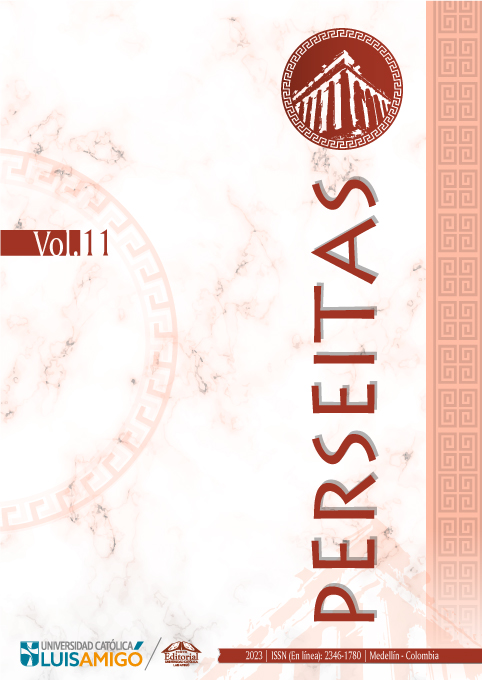Abraham as a metaphor for the Other human being in the philosophical work of Emmanuel Levinas
DOI:
https://doi.org/10.21501/23461780.4642Keywords:
Ethics, judaism, Metaphor, Other, Responsibility, TranscendenceAbstract
This work aims to undertake a theoretical reconstruction of the figure of Abraham as a central category in the formation of subjectivity in Jewish thought and to demonstrate how he becomes a philosophical reference in Levinas’ work. To achieve this, it delves into Levinas’s Jewish roots and his work, wherein the figure of Abraham emerges as the principle of ethical subjectivation in the process of constituting the covenant people, in contrast to the Greek figure of Ulysses. Among the findings of this study is the presence of Abraham as a self that responds to the call of the Other, not to absorb it into one’s selfhood, but to establish oneself as a being-for-the-Other and acknowledge the obligatory fulfillment of inescapable responsibilities tied to one’s existence. Furthermore, metaphor is described as an opening and an departure from oneself that leads the human being beyond their own self. The article concludes that Levinas’ philosophical thought, primarily grounded in ethics, has significantly contributed to our understanding of the human being as an essential Other in intersubjective relationships. This conception is rooted directly in the Jewish tradition, in contrast to the Greek tradition that has formed the basis of much of Western philosophy’s development.
Downloads
References
Bornapé, A. (2019). Memoria y judaísmo en Emmanuel Levinas. Enfoques, 31(1), 69−89. https://publicaciones.uap.edu.ar/index.php/revistaenfoques/article/view/865
Buber, M. (1949). ¿Qué es el hombre? (E. Imaz, Trad.). Fondo de Cultura Económica. (Obra original publicada en 1943)
Carassai, M. (2015). Metafora e trascendenza. Su Levinas [Metáfora y trascendencia. Sobre Levinas]. Lo sguardo: Rivista di filosofia, (17), 227-238. http://www.losguardo.net/public/archivio/num17/articoli/2015_17-Marco-Carassai-Metafora-trascendenza-su-Levinas.pdf
Del Mastro, C. (2012). Filología y fenomenología de la vulnerabilidad: la metáfora en el pensamiento de Emmanuel Levinas. Lexis, 36(2), 291−332. https://doi.org/10.18800/lexis.201202.004
Feldmann, M. (2022). Alterity, Alacrity, and Excess: Continental Philosophical Interpretations of the Figure of Abraham According to Franz Rosenzweig, Emmanuel Levinas, Jacques Derrida and Jean-Luc Marion [Alteridad, prontitud y exceso: interpretaciones filosóficas continentales de la figura de Abraham según Franz Rosenzweig, Emmanuel Levinas, Jacques Derrida y Jean-Luc Marion]. Religions, 13(15). https://doi.org/10.3390/rel13050438
Fernández Hart, R. (2018). Revelación y religión en Levinas. Estudios de Filosofía, (57), 119–137. https://doi.org/10.17533/udea.ef.n57a06
Hilario, G. (2019). The Notions of God by Emmanuel Levinas [Las Ideas de Dios según Emmanuel Levinas]. Social Science Research Network. http://dx.doi.org/10.2139/ssrn.3467746
Janicaud, D. (2015). Giro teológico de la fenomenología francesa (R. Ranz, Trad.). Ápeiron. Estudios de filosofía, (3), 287-296 https://www.apeironestudiosdefilosofia.com/numero3 (Obra original publicada en 2009)
Levinas, E. (1994). Cuatro lecturas talmúdicas (M. García Baró, Trad.). Riopiedras. (Obra original publicada en 1968)
Levinas, E. (1998). La huella del Otro (E. Cohen, S. Rabinovich & M. Motero, Trads.). Taurus. (Obra original publicada en 1967)
Levinas, E. (2001). Entre Nosotros. Ensayo para pensar en Otro (J. L. Pardo, Trad.). Pre-textos. (Obra original publicada en 1991)
Levinas, E. (2002). Totalidad e infinito. Ensayo sobre la exterioridad (D. Guillot, Trad.). Sígueme. (Obra original publicada en 1971)
Levinas, E. (2003). De otro modo que ser o más allá de la esencia (A. Pintor Ramos, Trad.). Sígueme. (Obra original publicada en 1978)
Levinas, E. (2008a). Difícil libertad: y otros ensayos sobre el judaísmo (M. Mauer, Trad.). Lilmod. (Obra original publicada en 1963)
Levinas, E. (2008b). Nombres propios (C. Díaz, Trad.). Fundación Emmanuel Mounier. (Obra original publicada en 1976)
Levinas, E. (2009). Humanismo del otro hombre (D. Guillot, Trad.). Siglo Veintiuno. (Obra original publicada en 1972)
Levinas, E. (2017). Nuevas lecciones talmúdicas (J. Medina Delgadillo, Trad.). Sígueme. (Obra original publicada en 1996)
Losada-Sierra, M. (2019). La ética de Levinas como naturalización del mesianismo judío. Theologica Xaveriana, 69(188). https://doi.org/10.11144/javeriana.tx69-188.elnmj
Malka, S. (2006). Levinas. La vida y la huella (A. Sucasas, Trad.). Trotta. (Obra original publicada en 2002)
Mauer, M. (2009). Entre lo griego y lo judío. Una relectura de la obra levinasiana. Revista de filosofía y teoría política, 40, 91−114. https://www.rfytp.fahce.unlp.edu.ar/article/view/RFyTPn40a04
Medina, J. (2017). Cuatro claves antropológicas en Humanismo del otro hombre de Emmanuel Levinas. Veritas (Porto Alegre), 62(1), 4−16. https://doi.org/10.15448/1984-6746.2017.1.16627
Navia, M. (2017). Emmanuel Levinas, el judaísmo y la idea de Dios. Estudios de filosofía, 55, 144−161. https://doi.org/10.17533/udea.ef.n55a09
Paredes Oviedo, D. (2018). La formación desde la perspectiva anárquica de Emannuel Levinas. Revista de Investigaciones UCM, 18(32), 132−145. https://revistas.ucm.edu.co/index.php/revista/article/view/119/pdf
Paredes Oviedo, D. (2019). Levinas: formación y anarquía. Aula de humanidades.
Pintor-Ramos, A. (1992). En las fronteras de la fenomenología: el creacionismo de Levinas. Cuadernos Salmantinos de Filosofía, 19, 177−220. https://summa.upsa.es/pdf.vm?id=960&lang=es
Rodríguez, F. J. (2021). El diálogo como proximidad en el pensamiento de Emmanuel Levinas. Cuadernos Salmantinos de Filosofía, 48, 529−553. https://revistas.upsa.es/index.php/cuadernossalmantinos/article/view/316/245
Sucasas, A. (1994). Judaísmo y filosofía en el pensamiento de E. Levinas: lectura de un palimsesto. Cuadernos Salmantinos de Filosofía, 21, 71−104. https://summa.upsa.es/pdf.vm?id=996&lang=es
Urabayen, J. (2004). La crítica de E. Levinas a la filosofía occidental. Abraham frente a Ulises. Estudios Filosóficos, 53(153), 313-332. https://estudiosfilosoficos.dominicos.org/ojs/article/view/957
Urabayen, J. (2008). Las huellas del judaísmo en la filosofía de Levinas. En A. A. Martos (Coord.), Emmanuel Levinas: la filosofía como ética (pp. 105−126). Publicacions De La Universitat De València.
Published
How to Cite
Issue
Section
License

This work is licensed under a Creative Commons Attribution-NonCommercial-NoDerivatives 4.0 International License.
La revista y los textos individuales que en esta se divulgan están protegidos por las leyes de copyright y por los términos y condiciones de la Licencia Creative Commons Atribución-No Comercial-Sin Derivar 4.0 Internacional.
















